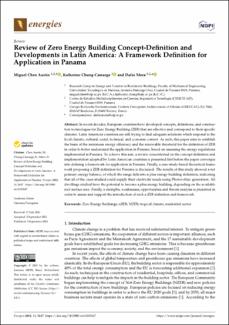Review of Zero Energy Building Concept-Definition and Developments in Latin America: A Framework Definition for Application in Panama
Fecha
2021-09-08Autor
Chen Austin, Miguel
Chung-Camargo, Katherine
Mora, Dafni
Metadatos
Mostrar el registro completo del ítemResumen
In recent decades, European countries have developed concepts, definitions, and construction technologies for Zero Energy Building (ZEB) that are effective and correspond to their specific climates. Latin American countries are still trying to find adequate solutions which respond to the local climatic, cultural, social, technical, and economic context. As such, this paper aims to establish the basis of the minimum energy efficiency and the renewable threshold for the definition of ZEB in order to better understand the application in Panama, based on assessing the energy regulations implemented in Panama. To achieve this aim, a review concentrated on the concept-definition and implementation adopted by Latin American countries is presented first before the paper converges into defining a framework for application in Panama. Finally, a case-study-based theoretical framework proposing a ZEB definition for Panama is discussed. The results of this study showed a net primary energy balance, of which the range falls into a plus energy building definition, indicating that all of the cases studied could supply their electricity needs using Photovoltaic generation. All dwellings studied have the potential to become a plus energy building, depending on the available roof surface area. Finally, a strengths, weaknesses, opportunities and threats analysis is presented in order to assess and support the introduction of such a ZEB definition and framework.
